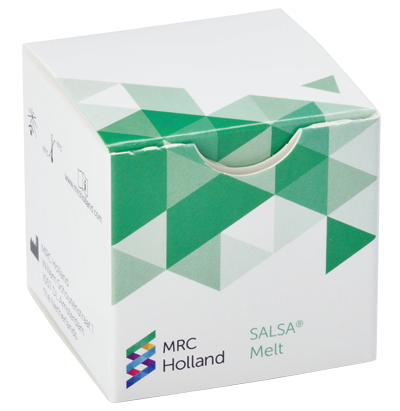The SALSA MLPA Probemix P460 SMA (Silent) Carrier is an assay for the detection of deletions or duplications in the SMN1 gene, which are associated with Spinal Muscular Atrophy (SMA). This probemix can also be used to detect the presence of two SMN1 polymorphisms, g.27134T>G and g.27706-27707delAT, for haplotype identification.
Spinal Muscular Atrophy (SMA) is a neuromuscular disorder characterised by degeneration of the anterior horn cells of the spinal cord, leading to symmetrical muscle weakness and atrophy. SMA is the second most common lethal autosomal recessive disorder in Caucasians, after cystic fibrosis. SMA is usually divided into three clinical groups. Patients with type I SMA (OMIM# 253300) show onset at birth or before six months, and usually die of respiratory insufficiency within two years. Type I SMA patients are never able to sit or walk. Patients with type II SMA (OMIM# 253550) show onset after six months. They can sit but are never able to walk unaided, and their life expectancy is significantly reduced. Type III SMA (OMIM# 253400) patients show the first symptoms after 18 months and are able to stand and walk, but often become wheelchair-bound during youth or adulthood.
There are two (highly similar) genes playing a pivotal role in SMA: SMN1 and SMN2. The telomeric SMN1 and the centromeric SMN2 genes are located in a complicated inverted repeat area spanning ~500 kb on chromosome 5q13.2. This area displays high instability, leading to frequent deletions and gene conversions. Most individuals have two copies each of SMN1 and SMN2, both consisting of nine exons (exons 1, 2a, 2b, and 3-8). The SMN1 and SMN2 genes can only be distinguished by two single nucleotide differences: one in exon 7 and one in exon 8. The exon 8 difference has no effect on the transcript; however, the exon 7 difference disrupts splicing in SMN2 most of the time leading to loss of functionality. Only 10-15% of the SMN2 transcripts are functional. This SALSA MLPA Probemix P460 SMA (Silent) Carrier detects the copy number of exons 7 and 8 of the SMN1 gene.
Absence of any functional SMN1 copy results in insufficient amounts of full-length transcripts. More than 95% of SMA patients show homozygous deletion of at least exon 7 of the telomeric SMN1 gene. Individuals with only one functional SMN1 copy are carriers of the disease. The great majority of SMA carriers can be identified by the presence of only a single SMN1 exon 7 copy. The one copy frequency in the US is estimated to be 1:37 for Caucasians, 1:46 for Ashkenazi Jews, 1:56 for Asians, 1:91 for African-Americans and 1:125 for Hispanics (Hendrickson et al. 2009).
Although the great majority of SMA carriers can be detected by copy number analysis of the SMN1 exon 7 sequence, some carriers remain undetected. These include carriers with (1) a defective SMN1 allele due to a point mutation in the SMN1 gene or a copy number change of exons 1-6 or 8, and (2) individuals that have two SMN1 copies on one allele and none on the other allele, the so-called “Silent Carriers” (2+0 genotype). The P460 probemix increases the detection rate of the latter group.
In most populations, approximately 6.3-15.5% of the individuals have two SMN1 copies on a single chromosome 5 strand, of which 0.07-0.19% are a silent carrier. In the African-American population this percentage is even as high as 47.2%, of which 0.41% is a silent carrier (Hendrickson et al 2009). Luo et al. (2014) has reported that a specific SMN1 haplotype block is present in a large percentage of Ashkenazi Jews who carry an SMN1 duplication. This haplotype was also identified on SMN1 duplication alleles in other ethnic groups, but in lower percentages. Detection of the SMN1 polymorphisms g.27134T>G and g.27706-27707delAT can aid in identifying this haplotype and thereby silent carriers.
More information on Spinal Muscular Atrophy is available at http://www.ncbi.nlm.nih.gov/books/NBK1352/.






